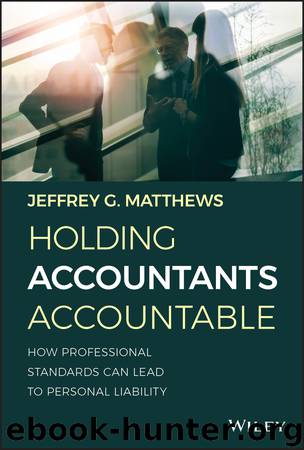Holding Accountants Accountable by Jeffrey G. Matthews

Author:Jeffrey G. Matthews
Language: eng
Format: epub
ISBN: 9781119597704
Publisher: Wiley
Published: 2019-11-12T00:00:00+00:00
However, the court ruled that PwC violated its professional duties to Colonial in various years’ audits. The court determined that it was reasonably foreseeable that PwC's failure to uncover the fraud allowed it to continue. The Order on the Damages Phase of the PwC Bench Trial filed on July 2, 2018, cited two determinations:
PwC did not design its audits so as to enable it to detect fraud, and
PwC did not obtain sufficient competent evidence.
The court noted errors, such as failure to inspect loans, follow up on illogical dates in financial reports, and failing to physically inspect collateral. As a result of these findings, the court found that the FDIC, as Colonial's Receiver, was entitled to $625,309,085 in damages from PwC.
The FDIC also brought claims against Crowe Horwath, who served as Colonial's internal auditor during relevant years. The FDIC claimed that Crowe “consistently overlooked serious internal control issues.” However, Crowe claimed their agreement with Colonial's parent expressly prohibits other parties from relying on Crowe's work, and it was only meant for management and not the FDIC.
Notwithstanding Crowe's claim, PwC's working papers mentioned how they relied on Crowe's work.
While the FDIC alleged gross negligence against Crowe, they alleged that PwC failed to perform procedures sufficient to compensate for any failings or verify the assertions about internal controls Crowe made on behalf of Colonial management.
Crow settled before their matter was brought to trial. It was reported they paid approximately $60 million in restitution.
Look at how many layers of “acceptance” are in this recent case. These are not situations in which rules have since provided guidance that could have helped the firms navigate to safe passage. Crowe undoubtedly relied on management, who were shown to have colluded and conspired to avoid detection. PwC relied on Crowe and management. What verification could Crowe have done? Would the outcome have been the same? Why or why not? How about PwC? What emphasis, both good and bad, would you have placed on PwC's comments on Crowe's work? Despite Crowe's representation that their work was not intended for third parties, is it fair to say they should have known others sought to rely on them?
Some cases are so outlandish they become movies. A recent movie is All the Queen's Horses.
It highlights a matter involving the treasurer for the City of Dixon. Dixon was a city with an annual budget of $6 to $8 million and a treasurer who found a way to steal almost $54 million over more than 20 years. How, you might ask? It started with a lot of trust and acceptance, yet few questions and verifications.
In 2013, the treasurer for the City of Dixon was sentenced to almost 20 years in prison, and ordered to repay nearly $54 million, after pleading guilty to bank fraud and money laundering. While her scheme was simple, the failures of the entities surrounding the fraud was puzzling. The scheme was elementary. The treasurer created almost 180 fictitious invoices for bogus capital projects. The city paid them, and the money went to the secret account.
Download
This site does not store any files on its server. We only index and link to content provided by other sites. Please contact the content providers to delete copyright contents if any and email us, we'll remove relevant links or contents immediately.
Harry Potter and the Goblet Of Fire by J.K. Rowling(3024)
Never by Ken Follett(2872)
Shadow of Night by Deborah Harkness(2710)
Ogilvy on Advertising by David Ogilvy(2677)
Zero to IPO: Over $1 Trillion of Actionable Advice from the World's Most Successful Entrepreneurs by Frederic Kerrest(2374)
The Man Who Died Twice by Richard Osman(2289)
Machine Learning at Scale with H2O by Gregory Keys | David Whiting(2264)
Book of Life by Deborah Harkness(2259)
How Proust Can Change Your Life by Alain De Botton(2255)
My Brilliant Friend by Elena Ferrante(2217)
0041152001443424520 .pdf by Unknown(2214)
The Tipping Point by Malcolm Gladwell(2200)
How to Pay Zero Taxes, 2018 by Jeff A. Schnepper(2094)
Will by Will Smith(2032)
Purple Hibiscus by Chimamanda Ngozi Adichie(1977)
Hooked: A Dark, Contemporary Romance (Never After Series) by Emily McIntire(1932)
Borders by unknow(1779)
Rationality by Steven Pinker(1760)
Daughter of Smoke and Bone by Laini Taylor(1737)
